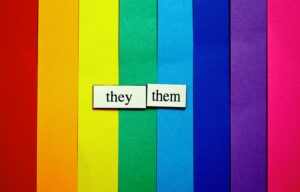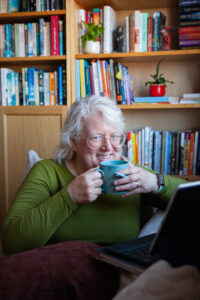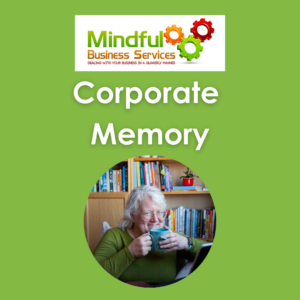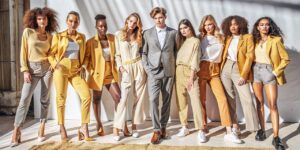What do we mean by Everyone?
Last year’s Swarthmore Lecturer, Ben Jarmen, challenged us to consider how we treat people who come from backgrounds that may not look like us, people who have been in prison for serious crimes (/everyone).
He asked would we consider welcoming them into our worshipping communities? Accepting that the individuals personal circumstances might need preparation and monitoring in a way that someone else’s personal circumstances might. There are structures in place to give meetings support as they explore these possibilities – and for safeguarding issues.

2023’s Swarthmore Lecturer, Esther Loukin asked ‘How can we change society’ to be more inclusive – and by inclusive not only physical access, but also included the social and emotional space that we share together. She quoted Mia Mingus saying that, “access is love and that love requires access of us.”
How can we make the meeting a community in which each person is accepted and nurtured, and strangers are welcome? Seek to know one another in the things which are eternal, bear the burden of each other’s failings and pray for one another. As we enter with tender sympathy into the joys and sorrows of each other’s lives, ready to give help and to receive it, our meeting can be a channel for God’s love and forgiveness.
Advices & Queries 18 Tweet
The quote above is a well known part of Qf&P – and it’s the first sentence that I want to explore today. When I talk to people about inclusion, they often jump immediately to ramps, disabled toilets and hearing loops. Rarely do we go into degendered toilets, inclusive language used in newsletters and notices, accessible gardens and kitchens, and considering who we hire our spaces to and how that might reflect on our buildings.
After Esther’s Swarthmore Lecture I realised how much I’d focused on ‘exactly what reasonable access’ was and not on how we could work to make people feel welcome and as part of our community. She quite rightly pointed out that good access is used by everyone when it’s convenient, when carrying heavy boxes, tired, temporarily injured etc. etc.
When looking at access at a meeting house as a venue for an event I reported happily to the client, that the suggested venue had an accessible building, loos, garden, and were only xx distance from a train station. I was thankful that more experienced access people pointed out that yes someone could get off the train to the road, but there weren’t sidewalks/safe verges between the station and meeting house, the loo was accessible but only for this level and not for that level of need. It was a useful education of unconcious bias – that someone could fit into a regular car and be given a lift, or could walk along the distance at the side of the road.
Our Religious Society includes a considerable number of people who to some degree live with disabilities, and we generally present quite a good record of considering their needs and attempting to cater for them – a consideration born of our conviction that there is ‘that of God’ in every person. But we should ask ourselves continually if this consideration is being maintained and whether it goes far enough. If we really mean that there is that of God in everyone, then it behoves us to look with creative, loving imagination at the condition of every human being. This includes listening to what they say, and the words they choose to say it, and also listening for what they do not or cannot say. It does not mean listening to what someone else says supposedly on their behalf.
Carol Gardiner 23.38 Qf&p Tweet
March 17th - 23rd is the Neurodiversity Celebration Week
This celebration of the ways different minds work is important to us – I am extremely grateful that some of the team love bookkeeping and bank reconciliations, while they are also grateful that someone else does the ‘stuff’ that they’re not so keen on.
This month’s Friends Journal focuses on Neurodiversity and how we as a community might make our spaces more accessible to everyone no matter how their brain works. But of course as mentioned above it’s not just physical spaces, but our expectations of our emotionally and spiritual time together as a worshiping community.
I believe the neurodivergent adults around me are also drawn to the ways in which Quakerism accommodates them, with its emphasis on social justice, celebration of intelligence, and tolerance of social awkwardness.
Katy MacRae in Friends Journal
Has your community ever considered ways to ensure all are included? Especially those who may be at the fringes of our communities?
February 2025 was the 20th LGBT+ history month
Quakers in Britain made a decision at their 2021 Yearly Meeting to “seek to provide places of worship and community that are welcoming and supportive to trans and non-binary people”.
“With glad hearts we acknowledge and affirm the trans and gender diverse Friends in our Quaker communities, and express appreciation for the contribution and gifts that they bring,”
. Quaker Rainbow has existed in various versions for many years and currently says it is:
Quaker Rainbow (previously the Quaker Gender and Sexual Diversity Community) brings together people of diverse sexual and/or gender identities within Quakers in Britain. It provides a voice and a meeting space for the LGBTQIA+ community. This includes lesbian, gay, bisexual, transgender, queer, intersex, asexual and gender non-binary Quakers, and Quakers interested in sexuality, gender identity and equality. We welcome others seeking an inclusive spiritual community.
Have you considered how your space might feel unwelcoming to those who don’t fit the male/female binary? Especially where there are already individual cubicles that could easily be labelled, ‘toilet’ rather than ‘male’ or ‘female’.
As with all things, each community and each individual will discern what they need to focus on for the right usage of their energy and time.


Places to start exploring and learning:
- http://www.quakerdisabilitygroup.org.uk/
- http://www.quakermhfund.uk/
- https://quaker-rainbow.org.uk/
All of us [Young Friends for Lesbian and Gay Concerns] have suffered discrimination or isolation because of our sexuality. We are all both angry and sad about the discrimination we face in everyday life, whether it consists of being unable to talk to work colleagues about a partner, or having to hide our sexuality in order to keep a job. The consequences of such necessary dishonesty can be very destructive both personally and for society.
Tessa Fairweather, 1993 Qf&P 23.45

Wendrie Heywood
MBS Founder










